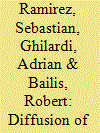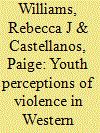|
|
|
Sort Order |
|
|
|
Items / Page
|
|
|
|
|
|
|
| Srl | Item |
| 1 |
ID:
127944


|
|
|
|
|
| Publication |
2014.
|
| Summary/Abstract |
ACM, Active Community Member, person that takes the initiative to fill out an application on behalf of a community; Seed, randomly selected ACM that allowed us to start collecting information; Ego, person that is interviewed. An Ego can also be an Alter, if it is mentioned by another Ego; Alter, people that provided (Type 1) or received (Type 2) information, as recalled by the Ego; Type 1 edge, an information flow in which an Alter provides information to an Ego; Type 2 edge, an information flow in which an Ego provides information to an Alter; Student, a person whose main occupation is to go to school; Radio, a message spread through the radio. Usually local stations in which an individual is interviewed; Internet, information about the stoves posted on Proyecto Mirador's Website; Maquila, a person that works at a factory for an international company, textile and food processing factories are usual; Agriculture, a peasant that works on agriculture, regardless of land tenancy; Health, a nurse, doctor or other health worker; Church, a priest, nun, minister or person who works as a minister of a faith; Education, a person who works as a school teacher or university professor; PM or PM associates, direct employees of Proyecto Mirador and its Implementers; Other NGO, a person that works on other non-governmental organizations. For example, Peace corps, Hivueras, Plan Honduras; Local, a local leader that has an appointment in the community but does not receive a monetary compensation. For example, members of the water board, village councils; Housewife, a woman whose main occupation is to keep the house; Business, a person that does commerce or services, includes people that sell food informally, artisans, masons, etc.; Government, a person who works directly for the government (except education and health practitioners); PM employees, direct employees without the implementers
|
|
|
|
|
|
|
|
|
|
|
|
|
|
|
|
| 2 |
ID:
171101


|
|
|
|
|
| Summary/Abstract |
Youth violence is a growing challenge worldwide, particularly in countries that are experiencing extreme social disorganisation. This is exemplified in Honduras which has been one of the top five countries in the world for intentional homicides for over 20 years. While many studies have examined youth violence in urban cities, few have researched youth violence in rural zones. This study presents a case study using social disorganisation theory to investigate the perceptions of 40 youth in rural and peri-urban Santa Rosa de Copán, Honduras, regarding what drives violence and the potential solutions. Consistent with social disorganisation theory, our results demonstrate that youth view violence as an opportunity pathway resulting from economic deprivation, disruptions to the family and neighbourhood, lack of or poorly functioning external agencies and conflicting moral values. There are significant gender differences in the results, with young men pointing to several issues that challenge masculine hegemonic gender norms such as the desire for love and belonging, participation in education and the role of policing.
|
|
|
|
|
|
|
|
|
|
|
|
|
|
|
|
|
|
|
|
|